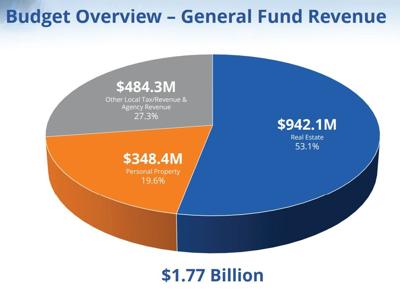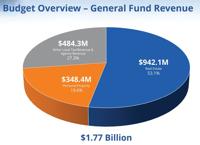The Prince William Board of County Supervisors on Tuesday voted unanimously to raise taxes on data centers in hopes of making good on the promise that data center revenue will help to offset the county's residential tax burden.
At the same time, the board unanimously agreed to cut next year's real estate tax rate to 92 cents per $100 in assessed value. The average homeowner's tax bill will be about $26 more than the current year, according to county officials.
The residential tax cuts were made possible by the data center rate increase. County officials said the data center tax increase would generate an extra $54.7 million in revenue during the next fiscal year, while the real estate tax decrease would result in a $21.1 million reduction.
Before the change, under the most recently proposed rate of 96.6 cents per $100 of assessed value, the average homeowner’s tax bill would have seen a 5% bump, or an average increase of $243. The 96.6 cents figure is also the current rate.
The net effect of the changes -- an extra $33.6 million -- would be split with the county school system, under a longstanding revenue-sharing agreement, giving an extra $19.2 million to the schools and $14.4 million to the county. The extra revenue represents just under 2% of the entire county budget, which is $1.77 billion.
The data center rate hike will bring Prince William County more in line with its neighbors in how it taxes the tech hubs. Data centers currently pay a rate of $2.15 per $100 of assessed value on computers, but the board in a bipartisan fashion raised that rate to $3.70.
Notably, the data center rate increase was approved in the face of opposition from the local business community, which pleaded with the board not to raise taxes so quickly for fear of destabilizing some small businesses that aren't data centers.
The new budget will take effect July 1.
The board also voted to partly fund the steep subsidy sought by OmniRide, filling much of the multimillion-dollar budget shortfall faced by the bus system. Supervisors agreed Tuesday to provide the transit system with $700,000 more than originally planned to protect key commuter routes from being decommissioned.
In total, the board is funding $30.1 million of the $33.3 million requested by the agency that oversees OmniRide, leaving a remaining few million shortfall. The agency – the Potomac and Rappahannock Transportation Commission – previously warned it will be forced to cut service if it can’t secure enough local funding to offset its rising costs, although it’s not immediately clear what those service cuts might look like.
OmniRide has historically been subsidized in Prince William through a motor fuel tax, which is projected not to bring in nearly enough to cover the total the agency is requesting from the county. The board will dip into additional tax funds to come closer to meeting the request, pulling $4.7 million from the grantor’s tax and $4.5 million from a tax on hotel rooms.
Rising costs fueled by inflation and the drying up of pandemic relief dollars has led the transit agency to need substantially more money than past budget cycles, according to agency officials.
Inflation has driven up the cost of bus materials, insurance and wages. OmniRide is competing for the same workforce as other regional bus transit agencies, which is also driving up labor costs, as is a collective bargaining agreement reached last year after a strike by drivers.
County transportation staff argued that the board fully funding OmniRide’s requested subsidy would be unsustainable and create a massive spending deficit for the county in the coming years.
Although members of the board broadly support the county’s need for robust bus service, they weren’t comfortable giving the agency the full request without assurances the bus system is taking initiative to find additional revenue sources beyond the county’s coffers.
As of fiscal 2023, OmniRide had more than 150 buses and completed more than 1.5 million passenger trips annually. The agency operates express and local bus services around the Interstate 95 and Interstate 66 corridors. Its six member jurisdictions are Prince William, Stafford and Spotsylvania counties and the cities of Manassas, Manassas Park and Fredericksburg.



(2) comments
Looks like there was a measurable benefit to PWC residents.
Note to Data Center critics. We will not see a measurable spike in temperatures, air pollution, or a doubling in electrical rates.
Now that Data Centers are actually being built, we will see real world results, not social media speculation.
Congratulations Prince William County Board of Supervisors on a collaborative and congenial budget cycle. Echoing others, I congratulate Chair Jefferson on her leadership, and I congratulate the Board as a whole for working together with the goal of serving the public. Bipartisanship in divisive times is both invaluable and much appreciated. Thank you for your example and for your service.
Welcome to the discussion.
Log In
Keep it Clean. Please avoid obscene, vulgar, lewd, racist or sexually-oriented language.
PLEASE TURN OFF YOUR CAPS LOCK.
Don't Threaten. Threats of harming another person will not be tolerated.
Be Truthful. Don't knowingly lie about anyone or anything.
Be Nice. No racism, sexism or any sort of -ism that is degrading to another person.
Be Proactive. Use the 'Report' link on each comment to let us know of abusive posts.
Share with Us. We'd love to hear eyewitness accounts, the history behind an article.